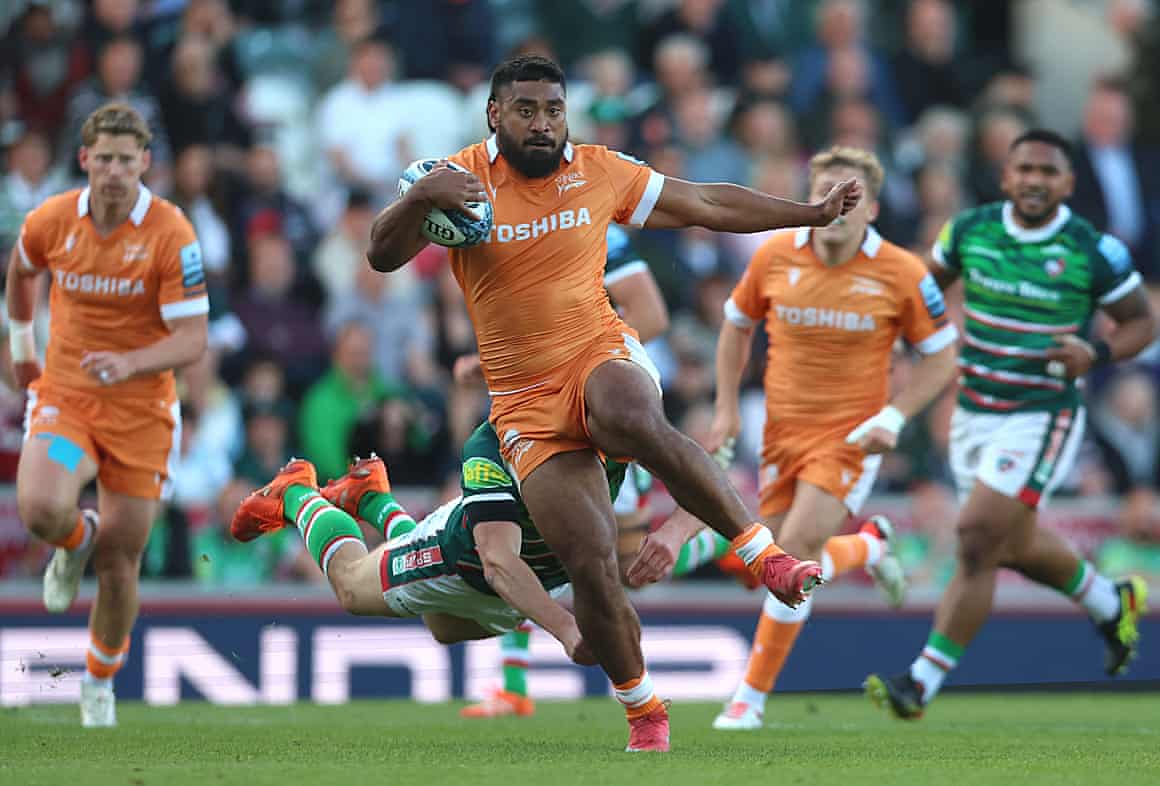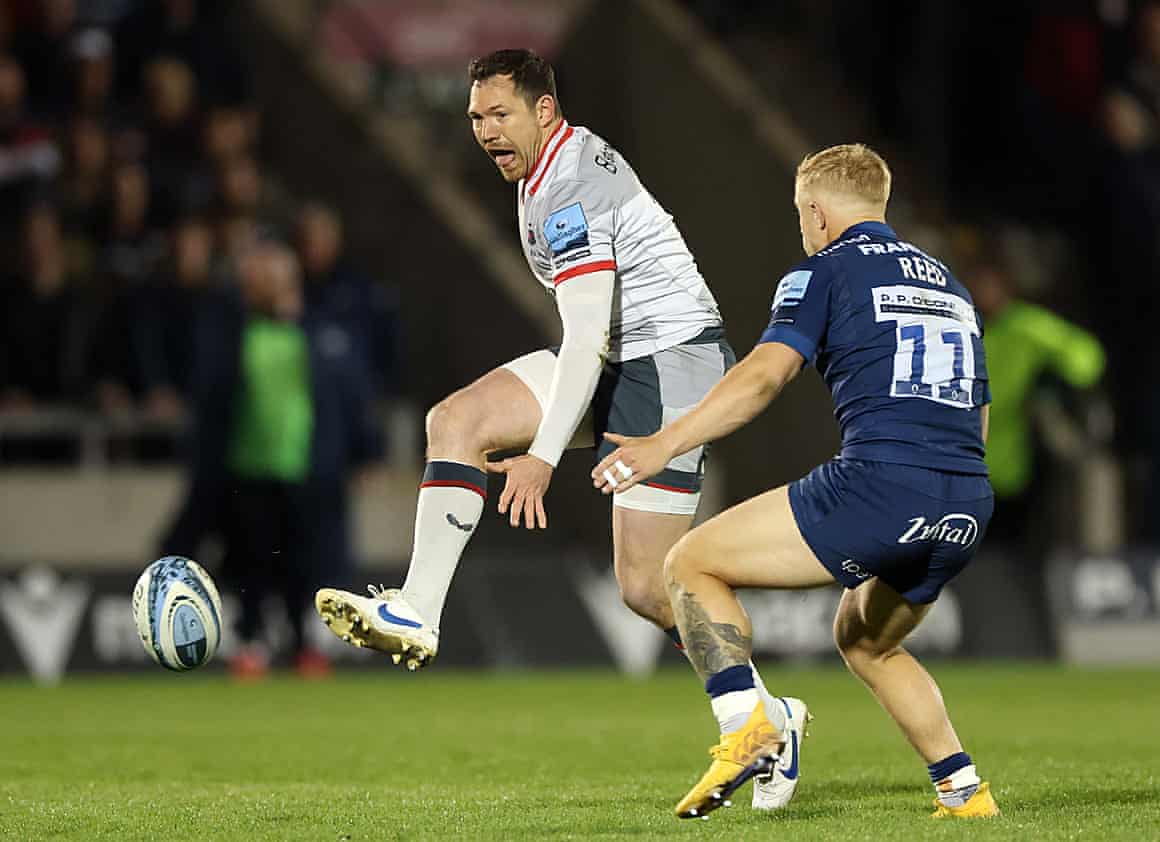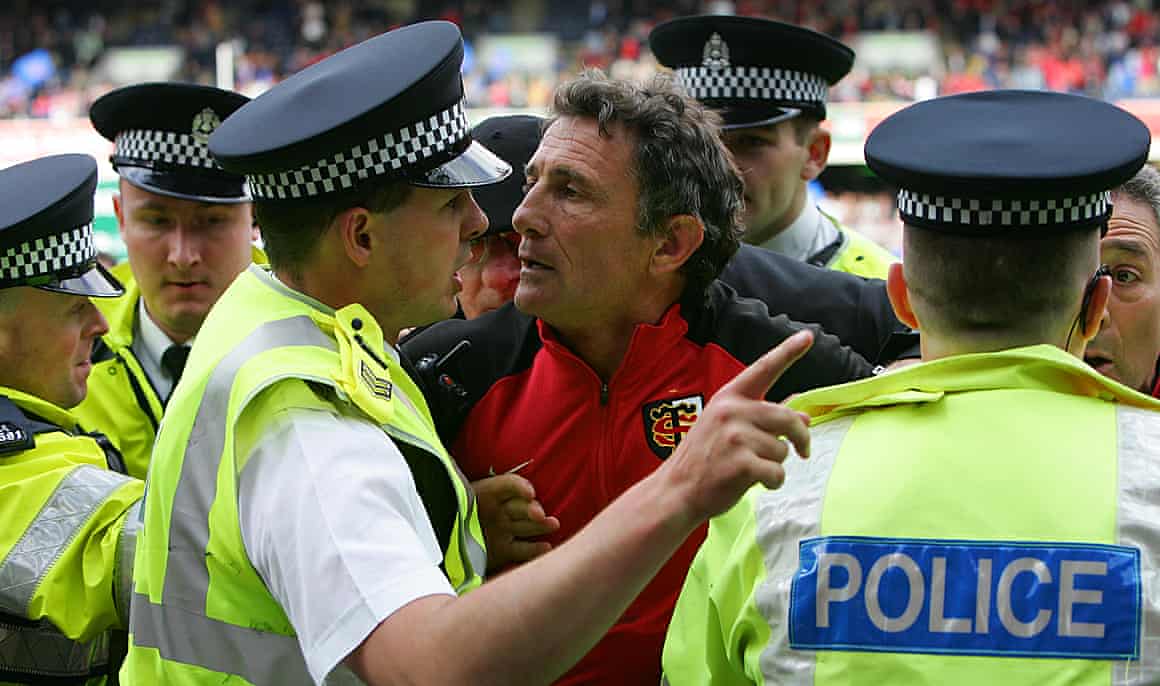 | | Rugby union’s bonus points barely change the Premiership table. Is it time for a change? | | | Research shows they make a major difference to 2.28% of positions, while play-off semi-finals also look redundant | |  |  Sale are fourth despite having the second-lowest bonus-point tally in the Premiership. Photograph: Nathan Stirk/Getty Images for Sale Sharks
| |  | Robert Kitson |
| | | The business end of the domestic season has arrived and the Premiership and United Rugby Championship tables, as ever, are being carefully scrutinised. Two from Bristol, Sale and Saracens are now vying to make the Premiership playoffs with two games left while the race for the URC top eight will boil down to the final weekend. At which point some know-all will intone the well-worn mantra: bonus points will be crucial. And we’ll all nod solemnly and start contemplating how Team X or Team Y can best set about scoring either four tries or losing by seven points or fewer. Without necessarily stopping to think whether the cold, hard mathematics support that supposition – or indeed ever have done. | | | | | | | If you go and consult Dr Ellie Nesbitt, a senior lecturer in sports management at Nottingham Trent University, a very different picture emerges. Having crunched the Premiership numbers for the past 25 years, she found bonus points made a major difference to – wait for it – just 2.28% of team positions in the 24 seasons in which they have previously featured. “Bonus points are not quite irrelevant but they’re definitely not making the impact they were probably designed to do,” she says. Hang on. That hard-earned losing away point in the rain at Sale? That valiant fourth try in the dying seconds against Bath? It turns out they barely count in the wider scheme of things. Nesbitt discovered that a whopping 92% of Premiership league placings were totally unaffected by their inclusion. No fewer than 10 of those aforementioned 24 Premiership seasons would have ended up with precisely the same league table had bonus points not been included. And in the 8% of occasions where teams would have finished in another position, it still made little material difference in terms of playoff or Champions Cup qualification. Which, for the curious-minded Nesbitt, prompts wider questions. Hailing from a football background, she only became interested in rugby union because her partner was playing at Burton RFC. Watching his team constantly looking for bonus points set her analytical brain whirring. “Even in their league they chase them. But then I looked at the data and told them: ‘It didn’t make any difference.’ I take the caveat that it potentially creates more of a spectacle but at the end of a season the difference is so marginal. So then you start to question it. ‘What is the point of all of this? Is it time for a refresh?’ For me it warrants a look at the effectiveness of bonus points. But no one in rugby union seems to be bothered that they’re not making an impact.” It is a fair cop. Take Sale who have claimed only nine bonus points – the second-lowest in the league – and still sit in the top four. What will almost certainly determine their final placing in relation to the Bears, as ever, will be their respective number of wins. It is more than possible the Sharks will finish ahead of Bristol with six fewer bonus points. So much for attacking rugby paying extra dividends. But let’s open our minds up beyond decimal points. Nesbitt’s research around competitive balance, incorporated last year into the Leonard Curtis financial report into English club rugby, invites us to contemplate a landscape totally free of such added complications. What if even the slightly tweaked French system – a bonus point for scoring at least three more tries than the opposition – is a hareng rouge? Because what if the extra layer of complexity, rather than enticing more people to enjoy the sport, is actively diluting rugby union’s popularity? “It’s weird to me that bonus points only really exist in rugby,” says Nesbitt, suggesting football’s relative simplicity is not an insignificant part of its appeal. “Rugby has so many layers that it’s difficult to get into. And when something is difficult to get into – whether that’s sport, music or history – people switch off. I don’t think rugby has helped itself over the years.” | | |  |  Bristol’s Viliame Mata dives in for a try against Bath on Saturday. Two from Bristol, Sale and Saracens are vying for a playoff spot. Photograph: Bob Bradford/CameraSport/Getty Images
| | | | She also wonders aloud if playoff semi-finals represent another well-intentioned idea that might have had its day. The team finishing either first or second in the regular season has gone on to win the Premiership 20 times out of the past 22 editions. Nesbitt’s logical academic brain tells her it would be much simpler to save everyone a ton of hassle and just stage a final between the top two sides. Looking further ahead, she argues, the league also needs to work out who, exactly, it is trying to please. At present, amid plans to launch a franchise Premiership model in autumn 2026, she suggests it is being hampered by blurred vision. “The reason why a franchise system works in America is because they also have the draft and a salary cap. Rugby union seems to have this half European, half American approach but it doesn’t seem to work for them either way.” Rather than using bonus points as a comfort blanket, accordingly, her analysis points to a more equitable spread of talent and spending power across the league as being more important. “The issue with rugby union is that the same patterns occur each year because no changes are made. What are your motivations? What do you want from the league? “If they want to make it a spectacle and make people excited about rugby, I have no doubt the franchise approach could do that. But it is not necessarily going to fix all their problems.” Plenty for us all to ponder, whether you love bonus points or not, before this season’s final push. Local heroes This might be a good week to remind ourselves that rugby’s heroes are not just those names listed on the British & Irish Lions squad list to tour Australia. Take Alex Goode, who chalked up his 400th appearance for Saracens on Saturday. What a wonderful contribution he has made, both to his club and the wider English game. The same applies to Peter O’Mahony in a Munster context; a deserving local favourite who will for ever be remembered for his unstinting service. Not forgetting, of course, all those other lower-league stalwarts bowing out this season after years of service. | | |  |  Alex Goode – in action for Saracens against Sale last month – racked up his 400th appearance last weekend. Photograph: David Rogers/Getty Images
| | | | One such player worthy of special mention is Sam Prior of Taunton Titans, known to all as ‘Turbo’ following an improbable try he scored from 70 metres out many moons ago. As well as being a hugely-popular team member, the larger-than-life Turbo has been a remarkable one. In 2019 he was diagnosed with pheochromocytoma, a rare tumour of the adrenal glands which forced his blood pressure up to frightening levels. At one stage he was in intensive care on life support and his doctors told his parents to brace themselves for the worst. Not only did he make a good enough recovery to play national league rugby again but a little over two years later, aged 33, he was picked to make the most romantic of senior debuts for Exeter v Worcester in the Premiership Cup. What a story, what a man. Go well, Turbo, and thank you. And finally Talking of legends, all of us at The Breakdown send the warmest of wishes to Sir Ian McGeechan and his family following the weekend announcement that he has been receiving treatment for prostate cancer. The former Scotland and British & Irish Lions head coach, who won 32 caps for Scotland and also toured twice with the Lions as a player, has just completed a six-week course of radiotherapy and will be unable to travel down to Australia to watch this year’s series against the Wallabies. Characteristically, he is more concerned about doing whatever he can to help others who are potentially in a similar position. “I don’t want to make a big thing of it but it is important to get the message out about urging people to go and get tested,” he said. Get well soon, Geech. Memory lane Twenty years ago this month at Murrayfield, Toulouse’s 18-12 win over Stade Français at Murrayfield ended in acrimony after the winning coach, Guy Novès, was led away to a police cell inside the stadium after a disagreement with a security guard. “I just wanted to kiss my mum and my son, and one of our officials wanted to join me,” explained Novès. “I asked the steward saying it was an important official and there was a bit of a scuffle. It was a misunderstanding. I am deeply sorry for the incident. It is not the style of Toulouse and I’d like to apologise.” | | |  |  Toulouse’s coach Guy Novès argues with police officers after his side beat Stade Français 18-12 at Murrayfield in May 2005. Photograph: Mike Finn-Kelcey/Reuters
| | | Still want more? Ugo Monye’s pick to be the Lions’ midweek captain? Henry Pollock. Andy Farrell’s Lions squad has both the flexibility and talent that can make touring Australia an epic adventure, reckons Robert Kitson. Maro Itoje has proven his shrewdness by tapping into the Mount Rushmore of Lions skippers over dinner, writes Rob. Leicester’s lengthy search for a successor to Michael Cheika is over. Step forward: Geoff Parling. And Martin Pengelly speaks to Robert Paylor, a US college star whose neck was broken in 2017, but whose paralysis has proved to be a beginning rather than an end. Subscribe To subscribe to the Breakdown, just visit this page and follow the instructions. And sign up for The Recap, the best of our sports writing from the past seven days. | |
| | | … there is a very good reason why not to support the Guardian | | Not everyone can afford to pay for news. That is why our website is open to everyone.
But – if you can afford to do so – here are three good reasons why you might consider becoming a Guardian supporter today: | | 1 | Your funding means we can be completely independent |
| | 2 | High-quality, trustworthy journalism is a public good |
| | 3 | You can support us however you like |
| | Help power the Guardian’s journalism at a time when misinformation is rife online and good news can be hard to find. It could be a one-off payment or a regular monthly amount of your choice. Thank you. | | |
|
|
| | |
| 
| Manage your emails | Unsubscribe | Trouble viewing? | | You are receiving this email because you are a subscriber to The Breakdown. Guardian News & Media Limited - a member of Guardian Media Group PLC. Registered Office: Kings Place, 90 York Way, London, N1 9GU. Registered in England No. 908396 |
|
|
|
|
|